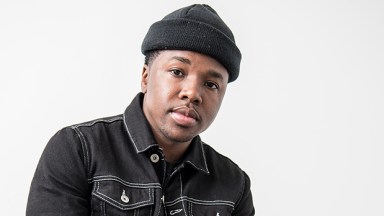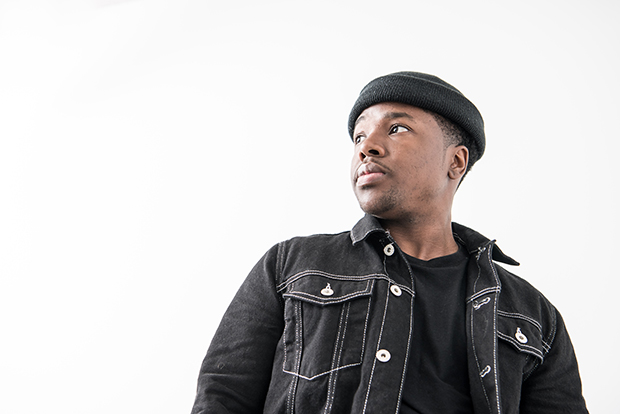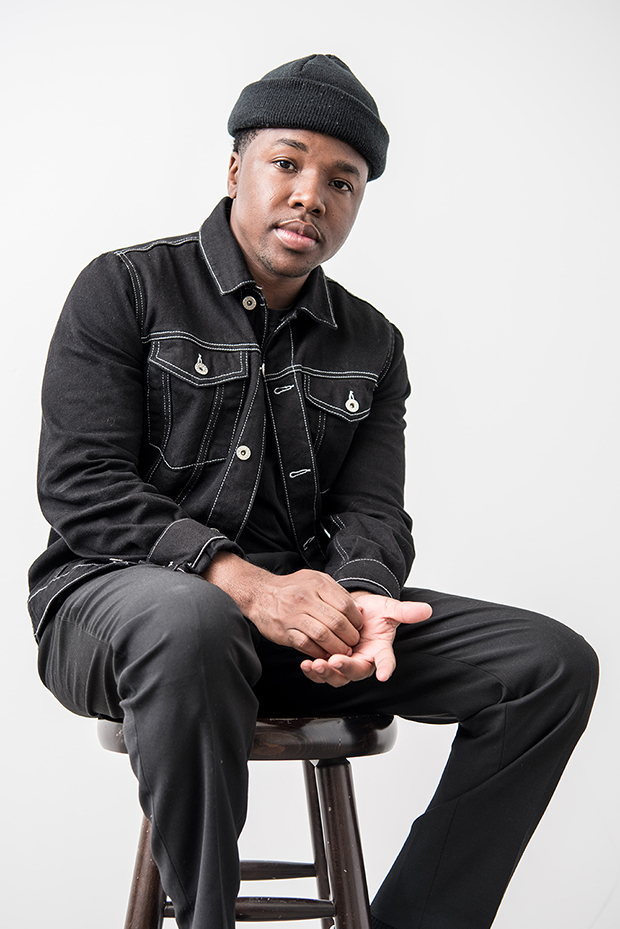
John Green’s beloved first novel is getting the TV treatment. Looking For Alaska makes its big debut as a limited series on Oct. 18. The road to adapting Looking For Alaska into a movie or television show was a long one, but the wait was worth it. The incredible characters and the story are truly larger than life and now we get to experience them in a new way. The limited series features a stellar cast that includes Denny Love, Charlie Plummer, Kristine Froseth, and Jay Lee.
HollywoodLife sat down EXCLUSIVELY with Denny to talk about all things Looking for Alaska in studio and at the Television Critics Association summer press tour. The Colonel is one of John’s most-loved characters and the series hit the jackpot in casting Denny. He simply is The Colonel. Denny discussed how closely he relates to the character and revealed how he was introduced to the story for the first time. The actor also talked about his incredible audition and why one part of the novel meant so much to him.
Why does Looking For Alaska work as a TV show?
Denny Love: If this was a movie, you couldn’t really fit in the whole story in movie format. For me, the dope thing about it being a limited series is everybody kind of knows these characters because Looking for Alaska is a fan favorite. People grew up on this book. It’s now about 15 years old, so everybody knows the story pretty well. For me, the limited series has allowed us to really get to know the characters as people a lot more. On the page, The Colonel just reads like an angry guy who’s funny. He’s the fiery guy on the show but you get to understand why he is the way is. You meet my mother for the first time on the show and you get to just really experience the world of all of these characters and understand them a lot more because they get to go more in-depth about who these people are.
Since we’re expanding on the character and meeting The Colonel’s mother, how do you think his home life shapes who he is at school?
Denny Love: He is a leader and that comes from having a strong person in your life. With his mom, it’s one of the first times you see The Colonel being a little more submissive. With anybody else in his life, he doesn’t take sh*t from anybody. But his mom is the one who makes him kind of bow down. She’s one of the people in his life that can put him in his place, which you don’t really see at school. He’s usually the fiery one that’s making everybody bow down to him. So you get to see a lot of that and then you get to understand his motives. You get to understand why he’s so passionate and why he doesn’t get along with the Weekday Warriors. Because the world that he comes from is completely different from the world of the other characters in the show. The Colonel grew up poor, so when he goes home, it’s a completely different life. When he’s at this school with all these rich kids who are pretty privileged and everybody’s smart and has money, you go home and it’s like The Colonel is the person that made it out. He’s the person in his community that everybody looks at like, “He’s going to make it big one day.” So there’s a lot of pressure with that, too. To know that I am the person in my community who inspires hope and gives people a chance to feel like, “Hey. Maybe one day I could do it, too, if Chip did it.” Because he’s really just a neighborhood kid who ended up getting blessed with intellect so he’s able to live a different life, but most people in his community stay in his community their whole life.
Do you closely relate to The Colonel?
Denny Love: I do. I think that was why it was such a special read for me when I read the book. I connected with the character pretty immediately. I understood him. I felt like we had a lot in common because I remember when I was that age I was angry. I went to a school that had a lot of kids who, in my eyes, had better lives than me and dealing with feeling like an outcast and dealing with a lot of the things that The Colonel deals with in the show. I just understood his perspective on a lot of things. I don’t necessarily agree with his methods, but I understood why he felt the way he felt about things. So when I got the audition I really felt like I just understood this character in a special way.
What was the road to getting the role of The Colonel like for you?
Denny Love: One of the things that was really dope about the process of me being involved in this project was I didn’t know about the book. When I initially got the audition, I was just really excited. It was an exciting time for me because I was really just hoping and praying to be on a TV show. I had never been one of the leading characters on a show before. I believe in manifestation, so I was writing down for months, “I’m going to book a TV show. I’m going to book a pilot.” I just kept writing it down every single day for like two, three months. I remember getting the audition and I read the first episode and was like, “This story just seems special.” I hadn’t read anything like it before. I was so excited about it and I told a friend of mine, “I think I just found the thing I’ve been waiting on.” And she was like, “Oh. What is this story?” I was like, “It’s like called Finding Alaska or something about Alaska.” And she’s like, “Looking for Alaska? I love that book.” And I was like, “Wait. What? Is this a book?” So I immediately went to Barnes & Noble and grabbed the book. When I read it, I just felt like I understood the character more than I thought anybody else could.
What do you think it was about him?
Denny Love: I think we kind of had similar upbringings. I just understood because he was raised by his mom. I was raised by my grandma. There’s a passage in the book that I read that made me cry. It was this passage where he talks about the best day ever. People who have read the book, they’ll know what I’m talking about, where he talks about the best day of his life. The game they’re playing is Best Day/Worst Day. You’ve got to tell the best day of your life and the worst day. This is the part where you really get to know all of the characters in more depth because you get to understand their motives for what they want and what has made them sad. The Colonel talks about the best day of his life being the day he’s able to buy his mom a house and just hand her the keys. When I read that, I felt like I understood the guy. He’s doing all of this stuff. He moved away from home, going to school with all these kids that don’t look like him, that are not relatable to him. He’s kind of alone in that way, just to provide a better life for a woman he loves and cares about. So I read that and I’m like, “Man, I think that’s the dream for a lot of people. You just want to be able to show the people you love that you care about them and you’re thankful for everything they did for you.” When I read that, I was crying. In the book, The Colonel just reads like this funny, angry dude. But this dude has so much heart. I’m so excited for people to see that. I had memorized that little passage and I honestly think this is why I got the role. I had the stuff that they give you and then I asked the casting director, “I know this is asking a lot, but this little part of this book just meant so much to me. And I just feel like if I never get to play this character, I just want to be able to have brought these words to life.” They were kind of taken aback. I told them that they didn’t have to record it or anything. I just wanted to do it in this room, just so I could get it into the universe. They were like, “No. We’re going to record it. Please, do it.” And they let me. We all were crying in the room. I was doing the monologue and it was one of those rare moments as an actor, I felt like I wrote the words. I started crying in the audition and then I look up and they were crying, too. After I finished, [casting director] Patrick [Rush] was like, “So is that what you want to do? Do you want to buy your mom a house?” And I was like, “You know, when I think about this monologue, I’m really actually talking more about my grandma.” He’s like, “Oh. Is that what you want to do? You want to buy your grandmother a house?” I said, “Well, my grandma passed away when I graduated from college, so no. I won’t ever be able to buy her that house. But for me, my version of buying her house is me chasing my dreams and being in this room and getting this role. Just showing her that I’m trying to achieve my dreams. Like that’s my version of that for her.” We were all just having a little cry session. And I ended up getting the role.
After having read the book and explored this character, why do you think this story is still so timeless?
Denny Love: I think that it is such a truthful representation of what it’s like to be a teenager. A lot of projects I’ve seen with young people seem very superficial. It seems very surface level. But in this project, you get to see the depth of what it’s like to be young, dealing with anger, relationships, love, loss, family, friends. It just really explores all the facets of what it’s like to be young. I just think it shows a really honest portrayal of what it’s like to be a young person.
What’s your message to fans, especially the book readers, who are getting ready to watch this series and see it come to life in a new way?
Denny Love: I will say that we put so much love and care and just joy into this project so I 100 percent believe that the fans are going to feel how special this project is, based on how we felt while filming it. It was just one of those processes that’s hard to explain to everybody. Not just us, but the cast, the crew, everyone, just put so much passion into this project and we understood how important this was to people because it was as important to us. I think the fans are going to feel exactly what we felt. This project is special and we really tried to keep the integrity of what John Green wrote.


There are going to be so many teens and people that watch this show, what do you want them to take away from the show’s exploration of grief and loss?
Denny Love: That’s a tough one because I’m still dealing with how to understand grief today. I think it’s important to recognize that life is very fickle, you know? It’s all about balance. You take the tough times with the good times. But for me, that’s why it’s so important that I think young people, and old people, can take away that you got to give people their flowers while they’re still here. If you love somebody, tell them, because things change so quickly. If somebody makes you laugh, tell them, “I think you’re great. You make me laugh. You one of my favorite people.” Don’t wait to give people their flowers when it’s too late because the worst is to live with the regret of something you should’ve said or something you could have done. So one of the toughest things that Miles and The Colonel have to deal with is regret. So for me, give people their flowers, man. If you love them, tell them you love them today. Don’t wait.
What do you think that The Colonel represents in Looking For Alaska?
Denny Love: I think Chip is one of the rawest characters in the show. Because it’s beautiful to me that he is so uninhibited. When he’s angry, he’s going to tell you he’s angry. He just has so much life, so it’s exciting to play a character who is kind of unhinged in that way. He’s just so real. Miles is a more internal person. You get to see what he’s thinking, what’s going on in his head. Alaska’s a little more closed off. She’s very mysterious. But The Colonel, you get what you got with him. He’s just raw. He’s real. He is who he is. So I don’t know that I know what he represents in the story because when you meet him, he’s immediately the navigator. He really brings everyone into this world so you start to understand the story. He introduces Miles to Alaska, the Weekday Warriors, he brings him into this world. You kind of get to walk through the world with him, so the audience kind of feels like Pudge.


